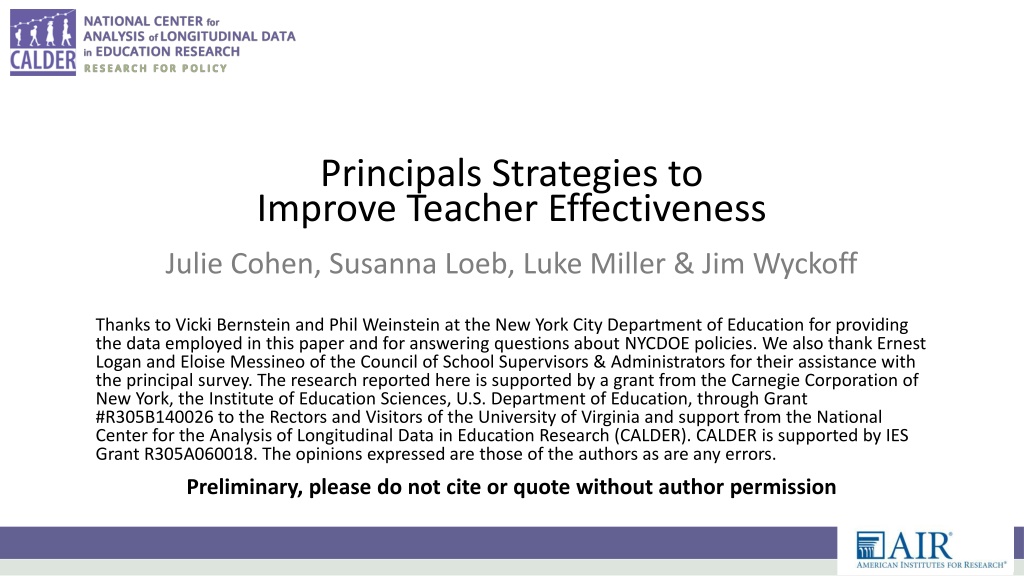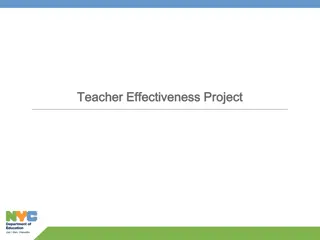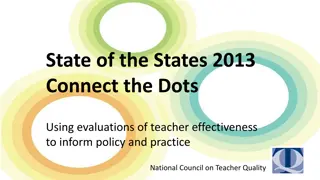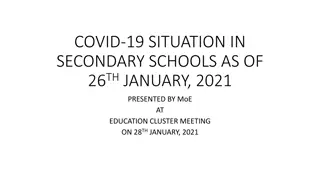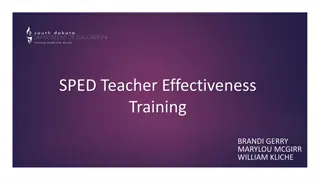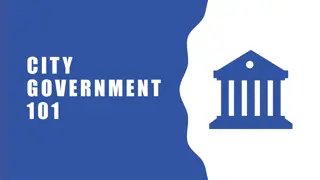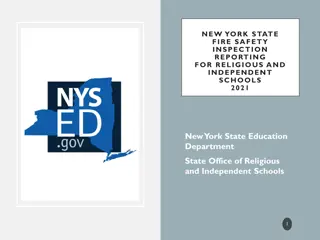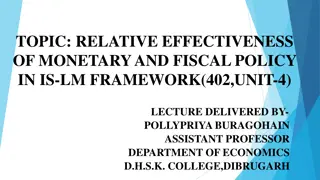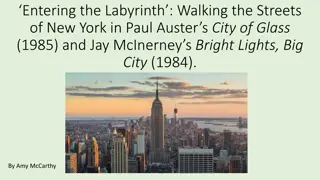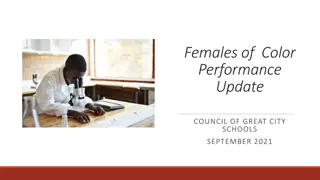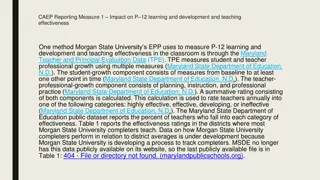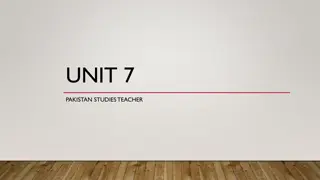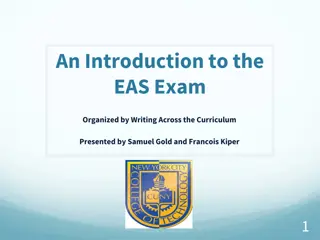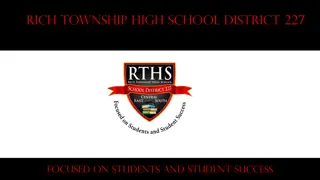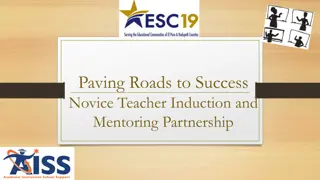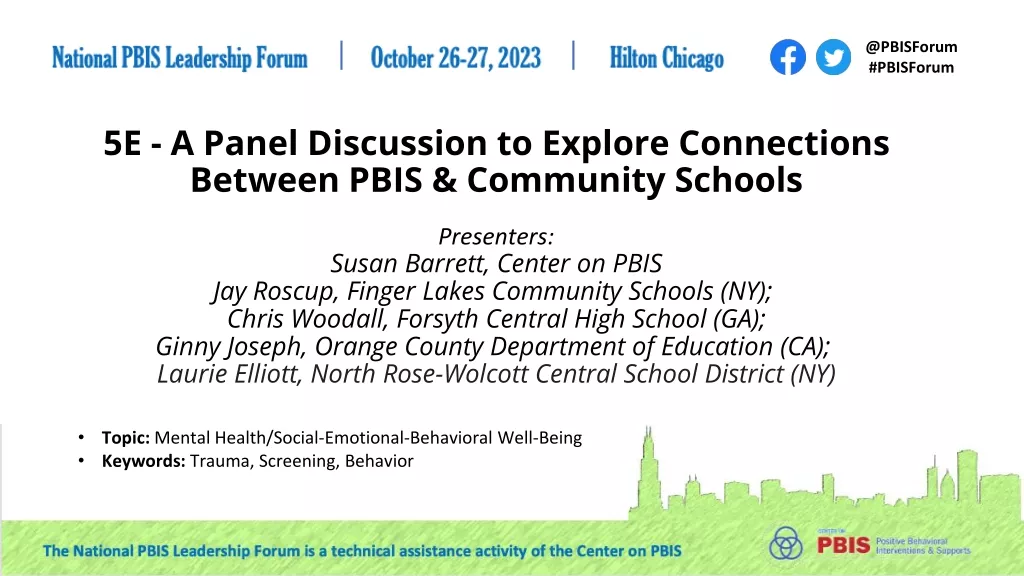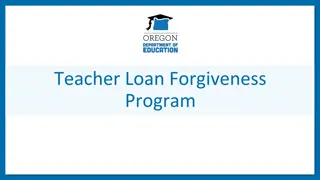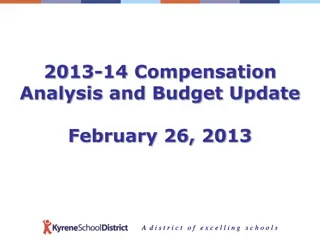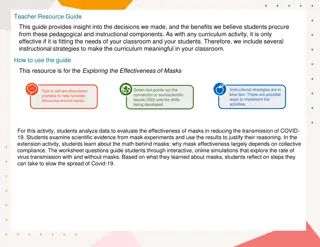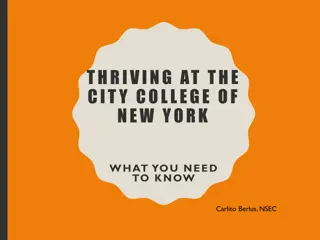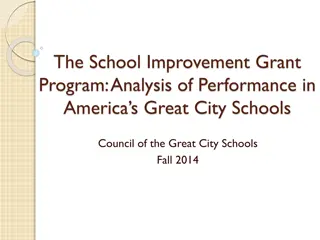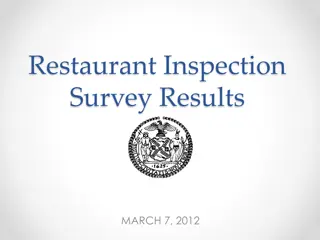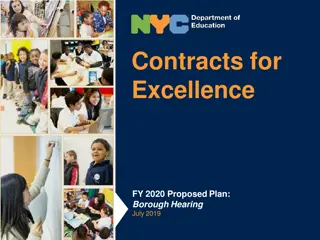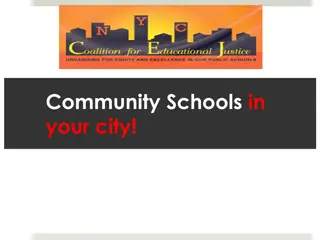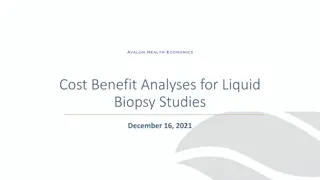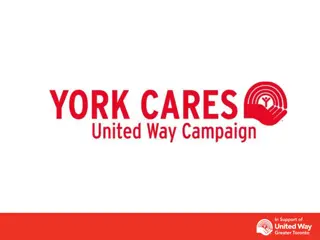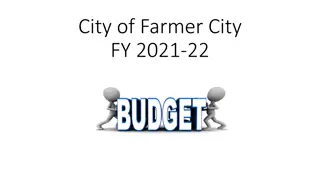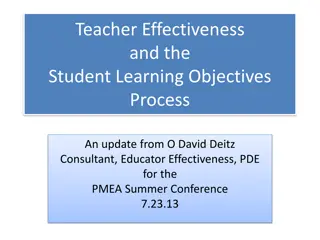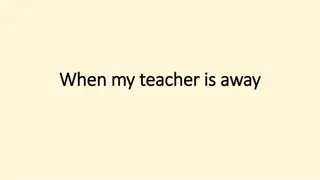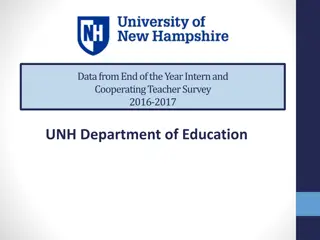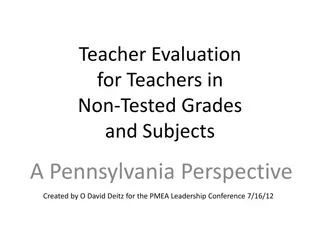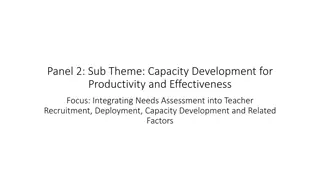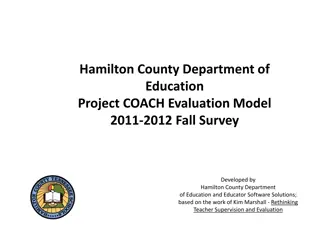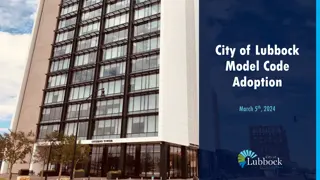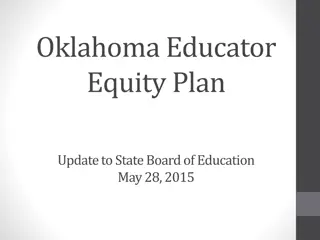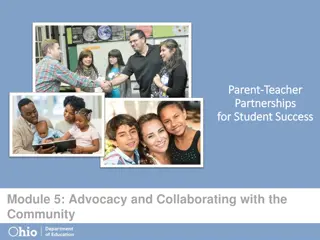Strategies to Improve Teacher Effectiveness in New York City Schools
This research paper explores various strategies implemented in New York City schools to enhance teacher effectiveness. Topics covered include tenure reform, principal strategies, variation in extending teacher probationary periods, and the impact of principal effectiveness on student achievement. Initiatives such as teacher evaluation, mentoring programs, and professional learning sessions are detailed as part of the effort to improve teaching quality.
Download Presentation

Please find below an Image/Link to download the presentation.
The content on the website is provided AS IS for your information and personal use only. It may not be sold, licensed, or shared on other websites without obtaining consent from the author. Download presentation by click this link. If you encounter any issues during the download, it is possible that the publisher has removed the file from their server.
E N D
Presentation Transcript
Principals Strategies to Improve Teacher Effectiveness Julie Cohen, Susanna Loeb, Luke Miller & Jim Wyckoff Thanks to Vicki Bernstein and Phil Weinstein at the New York City Department of Education for providing the data employed in this paper and for answering questions about NYCDOE policies. We also thank Ernest Logan and Eloise Messineo of the Council of School Supervisors & Administrators for their assistance with the principal survey. The research reported here is supported by a grant from the Carnegie Corporation of New York, the Institute of Education Sciences, U.S. Department of Education, through Grant #R305B140026 to the Rectors and Visitors of the University of Virginia and support from the National Center for the Analysis of Longitudinal Data in Education Research (CALDER). CALDER is supported by IES Grant R305A060018. The opinions expressed are those of the authors as are any errors. Preliminary, please do not cite or quote without author permission
Tenure reform in New York City (CALDER 2015) New tenure policy 80% of schools had at least 4 teachers receive an extension in the first 4 years 100% Percent of Decisions 80% Extended teachers are less effective than approved teachers Math: 38% SD ELA: 22% SD 60% 40% 20% Extended teachers 50% more likely to exit district 0% 2006-07 2007-08 2008-09 2009-10 2010-11 2011-12 2012-13 2013-14 Approve Extend Deny
Substantial variation in the use of extending teachers probationary period NYC middle schools with at least 4 extensions, 2010-2014
Background Variation in principal effectiveness (Branch, Hanushek &Rivkin, 2012; Grissom, Kalogrides & Loeb, 2012; Heck, 1992) Instructional leadership predicts achievement gains (Robinson, Lloyd & Rowe, 2008) Principal investment in teacher coaching & evaluation predict achievement gains (Grissom, Loeb & Master, 2013) Principal use of classroom walkthroughs negatively influences achievement (Grissom, Loeb & Master, 2013)
New York City policies designed to influence teaching effectiveness Tenure reform (2009): Principals encouraged to make the review of tenure decisions more data driven and rigorous. Teacher evaluation (2010): evaluation of teachers employing teacher observation and student achievement. Mentoring (2004): All first year teachers receive a year of mentoring from a qualified, school-based mentor. Professional learning (2014): All teachers are required to participate in a weekly 80 minute professional learning period determined by principals and/or a committee in each school.
Principal Strategies Theory of Change NYC/NYS Policies Mechanisms Outcomes Tenure Teacher Composition Evaluation School collegiality and trust Teaching Effectiveness Student Outcomes Principal Professional Learning Teaching Capacity (Human Capital) Mentoring
Data Survey of middle school principals Survey all 494 middle schools during summer 2016 52 percent response rate Non-respondents very similar to respondents on observables Information on tenure decisions 2007-08 to 2013-14 Outcomes of each decision Official guidance from NYCDOE for decision Variety of other data related to tenure decision Administrative data 2000-2014 Usual student, teacher, school data Data on principals Teacher application to transfer data and details of tenure decisions Principal Interviews: interviews with 45 of 258 survey respondents NYCDOE School Climate Survey Survey of middle school teachers
Principals report of the percent of teachers who met or exceeded principals expectations for effective teaching .02 Mean Median = 10th 25th 75th 90th = 69% 77% 30% 54% 90% 95% .015 Proportion of Principals = = = = .01 .005 0 0 10 20 30 40 50 60 70 80 90 100 Percent of Teachers Source: Principal Survey, 2016, question 2
Principal beliefs about their ability to help pre- tenure teachers improve their effectiveness Teachers who are below expectations Teachers who meet or exceed expectations 50 50 40 40 Percent of Principals Percent of Principals 30 30 20 20 10 10 0 0 Not at all Some A good amount A lot Not at all Some A good amount A lot Source: Principal Survey, 2016, question 3
Principal beliefs about their ability to influence pre- tenure teachers decisions to leave or remain Decision to leave by teachers whose performance is below your expectations Decision to remain by teachers who meet or exceed your expectations 50 50 40 40 Percent of Principals Percent of Principals 30 30 20 20 10 10 0 0 Not at all Some A good amount A lot Not at all Some A good amount A lot Source: Principal Survey, 2016, question 4
Of Principals who believe they can improve effectiveness of pre-tenure teachers A Lot Do they believe they can influence a decision of an effective pre-tenure teacher to remain Do they believe they can influence a decision of an ineffective pre-tenure teacher to exit 50 50 40 40 Percent of Prinicpals Percent of Principals 30 30 20 20 10 10 0 0 Not at all Some A good amount A lot Not at all Some A good amount A lot
Principals Beliefs about their Agency Of Principals who believe they can improvement effectiveness of pre-tenure teachers "A Lot v. None or Some Do they believe they can influence a decision of an effective pre-tenure teacher to remain 60 Do they believe they can influence a decision of an ineffective pre-tenure teacher to exit 60 50 50 40 40 30 30 20 20 10 10 0 0 None or Some Good Amount A Lot None or Some Good Amount A Lot Improve None or Some Improve A Lot Improve None or Some Improve A Lot
Is principal agency associated with different behaviors? Percentage of teachers who are Extended by principals belief of their agency to improve the effectiveness of pre-tenure teachers who are below expectations and to exit ineffective pre- tenure teachers to improve the effectiveness of pre-tenure teachers who are below expectations and to retain effective pre- tenure teachers 40 40 30 30 Percent Extended Percent Extended 20 20 10 10 0 0 Some/Some A lot/A lot Some/Some A lot/A lot
How do principal beliefs in their agency on teacher retention match teacher behavior? Table 1. Association between percentage of teachers who apply to transfer and principals belief in their ability to retain effective teachers Survey Sample Application to Transfer, 2013-14* Mean 25th percentile 50th percentile 75th percentile 90th percentile = .112 = 0.0 = .072 = .151 = .269 Extent influence a decision to remain by a teacher meets or exceeds expectations for:* Pre-tenure A good amount 0.002 (0.025) Tenured -0.023 (0.024) * Note mismatch between years of survey and ATT data A lot -0.015 (0.026) -0.022 (0.024) *Regressions controlling for student attributes, principal experience and enrollment. Omitted group is those who answered Not at all or Some
Principal Agency and Their Practice of Formal Observation Frequency of principal-teacher conversations with pre-tenure about instructional practice for Advance and: Differences in influence on decision of ineffective teachers to leave Differences in influence on decision of effective teachers to remain 60 60 50 50 40 40 Percent Percent 30 30 20 20 10 10 0 0 Some A lot Some A lot Talk few times a year Talk once month Talk few times a year Talk once month
New York City Tenure Policy Unfortunately, over the years tenure has become an expectation more than an honor. While we have made progress, we still are not doing enough to set a high bar for all teachers, recognize excellent teachers, or withhold tenure from all of those who have not earned it. And a loose tenure system isn t good for anyone it hurts students, it disrespects successful teachers, and it leaves those who are not up to the difficult job to struggle. Letter from Chancellor Klein to teachers during AY 2009-10
Tenure reform in New York City Increased responsibility and accountability of principals More information (e.g., value- added) Increased documentation and evidence to support recommendation Changes to the tenure review process 2005-06 2006-07 2012-13 2009-10 2010-11 2014-15 2007-08 2008-09 2011-12 2013-14 NYC tenure process similar to many other large urban districts
Effects on tenure outcomes New tenure policy 100% Percent of Decisions 80% 60% 40% 20% 0% 2006-07 2007-08 2008-09 2009-10 2010-11 2011-12 2012-13 2013-14 Approve Extend Deny
Summary Principals agency positively correlated across domains of teacher quality but important differences Suggestive evidence that agency is correlated with behaviors We are just beginning to explore how principals strategies and behavior may systematically influence teacher quality Connect rich administrative data on teacher value-added, teacher observation outcomes, school climate to the use of the four policies Use interviews to provide explanations of strategies Stay tuned for CALDER 2018
